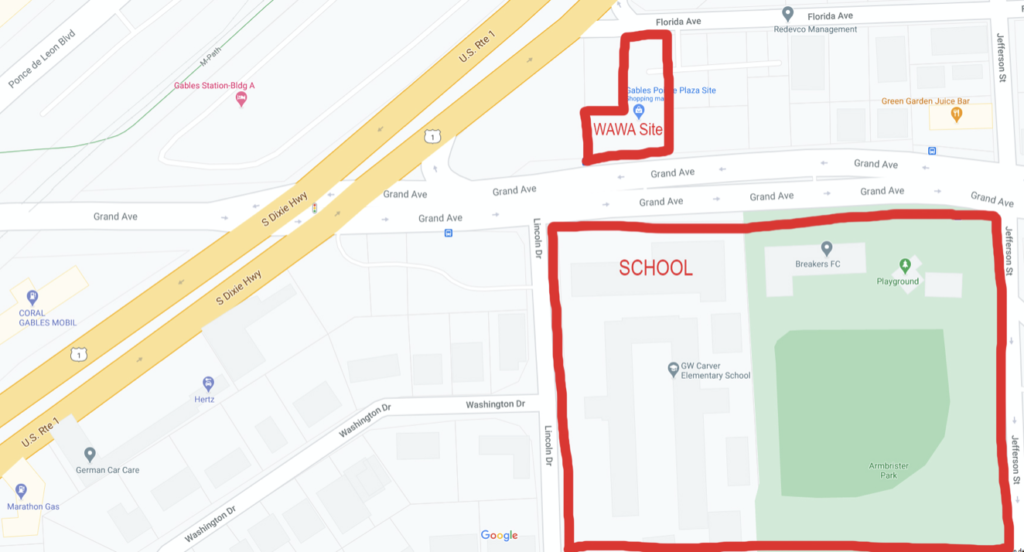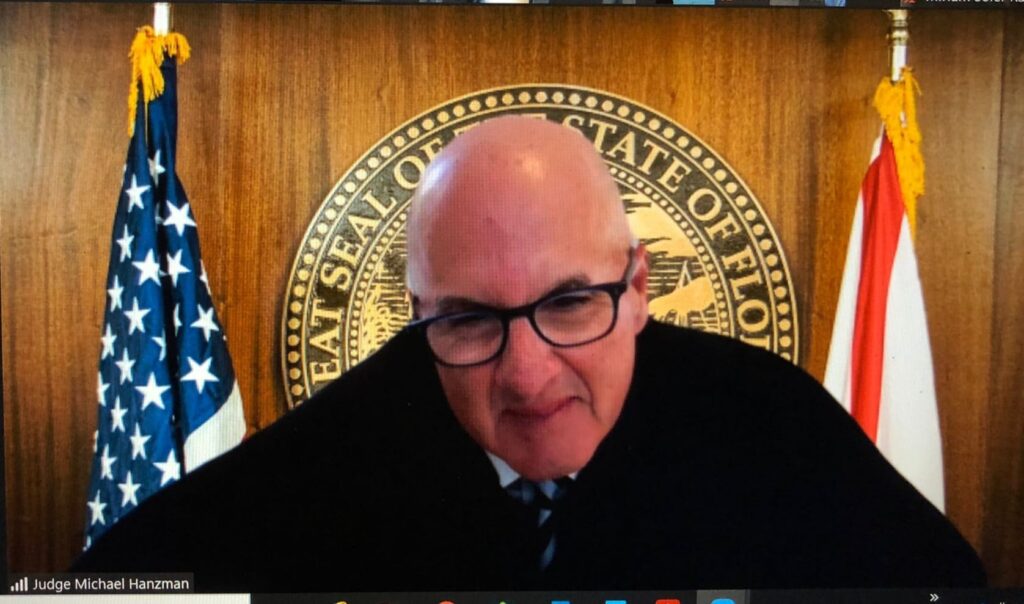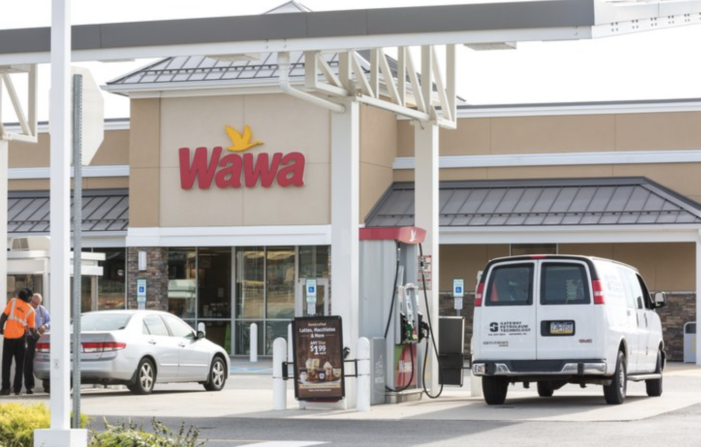City commission could give attorneys new direction
A Miami-Dade judge last week refused to dismiss a case against the city of Coral Gables, saying the attorney and administration had no right to make massive changes without public input to a planned development that turned a restaurant into a WaWa.
The Wednesday court debate also indicates that the judge is likely to rule in favor of the Gables Accountability Project, a group of nearby residents and concerned parents at Carver Elementary School across from the WaWa build site who have sued to stop the construction of the gas station and convenience store a few hundred feet from their kids’ kindergarden class. They say the city perverted its own process and rules to approve a legal settlement that basically rammed the gas station down everyone’s throats without any public notice and without any public process. They want the settlement and the proposal thrown out.
Borron y cuenta nueva.
Circuit Court Judge Michael Hanzman seems to agree. The city got a good spanking from Hanzman on Wednesday when he said city administrators basically had no right to make such a major change.
Read related: Judge says lawsuit against Coral Gables WaWa deal is ‘important,’ good to go
The city has 10 days from then to appeal the decision. Or it could decide to defend the lawsuit in court. Commissioners will likely give City Attorney Miriam Ramos direction on that Tuesday when they have a shade meeting — ironically outside the public eye — on the legal matter.
A quick refresher on the long, convoluted history that brought us here:
This reverse L piece of land sits in the McFarlane Homestead Historic District, also known as Black Gables, and it was deeded to the Lola B. Walker Homeowners Association in 2007 by Miami-Dade County for $10. The original idea was to turn it into affordable housing with some neighborhood retail. But that was scrapped and in 2014, Gables city commissioners approved a planned area development called Bahamian Village that would include a community center, a restaurant, and offices — which are basically occupied by the developer.

While none of the plans panned out, the county threatened to take the land back. In 2017, the county, city and the Lola B. Walker Foundation reached a legal settlement that included turning the property into a WaWa gas station.
They told nobody. Not the residents. Not the commission, apparently. Not the principals at either the elementary or Carver Middle School behind it. Not the Miami-Dade School Board, which has also objected to the WaWa.
And, voilá, the land that residents and everyone else thought would originally serve as housing or neighborhood amenities, is now slated to be a 24-hour stop for unleaded gas and stale chicken wings.
Read related: WaWa Whaaaat? Coral Gables to get a gas station across elementary school
At Wednesday’s hearing, Ramos and outside counsel Annie Hernandez Gamez, from the Holland & Knight law firm, called that a minor modification. They argued that the city charter authorizes the city attorney to “take all actions necessary to disputes,” as well as language in a 2015 resolution that authorized administrators “to amend a planned area development that had already gone through the approval process.”
The judge said de eso nada.
“She could have said ‘I am scrapping the PAD and we’re going to put an adult book store here,'” Hanzman asked pointedly. When he thinks about minor modifications, “I think it will have 9 parking spots instead of 10, or we’re going to slant the roof a different way, or put a door somewhere else,” the judge said, calling what happened a possible “material change of use.”
“I have so many questions and concerns about this process that I don’t even know where to begin,” Hanzman said, echoing so many people in Coral Gables who can’t even fathom why we are here in the first place.
“I’m not buying what you’re selling,” Hanzman told the city attorneys. “I read that ordinance 10 times over and I see nothing in it that even remotely delegates the city attorney or the city manager the autority to modify this PAD. As far as I’m concerned, at this point in the case, this appears to be a completely unlawful delegation.”

Hanzman also seemed very concerned that there is no indication the settlement agreement was approved by the city commission. He kept asking and the city attorneys kept skirting the question.
Instead, reading the room, they went to Plan B: Even if the city did something wrong, the deadline to challenge that decision — 30 days from the time the city attorney’s opinion gave the settlement the green light — had passed. That’s right, they’re now relying on timing.
In other words… City attorneys: Yeah, we may have jammed this project down people’s throats without proper notice. But the window to catch it has closed. So there!
Seriously? How can they say that with a straight face. The window closed because the whole thing was done in secret.
City Commissioners will have their own chance to spank Ramos and fire Gamez on Tuesday. It’s just too bad that it won’t be in front of anyone as shade meetings are legally able to be outside the sunshine because they deal with ongoing litigation.
Read related: Unregistered lobbying lead to removal of old oaks for Coral Gables WaWa
Ladra made a public records request for the invoices and payments made so far to Holland & Knight for Gamez’s services. Nothing yet but it isn’t going to be a small amount. The lawsuit was filed last January.
Attorney David Winker, representing the Gables Accountability Project, said it was a great step for the residents. “Because they are holding their government accountable,” Winker told Ladra.
“Everyone agrees that a gas station 200 feet across the street from an elementary school is a suboptimal result,” he added. “Our lawsuit is showing why this happened — residents were not notified of what was happening and were not allowed to participate.
“Bad process equals bad results,” Winker said. “Garbage in, garbage out.”

Ramos told Ladra in an email that the “city disagrees with the judge’s ruling” because of the timing thing. “The court lacks subject matter jurisdiction because the case is time barred. Whether as a petition for writ of certiorari, as a direct appeal, as an appeal of a staff decision or whether the challenge was based on a claim that the approval violated the comprehensive plan, the plaintiffs far exceeded the time period allotted to challenge,” she wrote.
But she didn’t complain about the jurisdiction at an earlier hearing in September where the judge asked Winker for more details and Ramos crowed about it like a victory in an email to commissioners. She said the parents had been warned that they could lose because people have property rights and that she was hopeful “the city will prevail in having this complaint dismissed with prejudice at the next hearing.”
Oooops. Can they have confidence in what she says Tuesday?
None of the commissioners reached by Ladra via text late Monday answered questions about where they want the attorneys to go from here or how much the legal battle has cost taxpayers so far. That includes Kirk Menendez, a newby sworn in last year by Judge Carlos Gamez, the outside counsel’s husband.
Only Mayor Vince Lago answered Ladra’s questions. Sorta.
Lago said he doesn’t know how much the city has spent on defending this proposal and that he will be briefed at 12:30 p.m. Tuesday with the rest of the commission. But he also sounds like he doesn’t want to get in the fight.
“The issue is complex because it pits resident interests who are in favor versus those of Carver parents who oppose the WaWa proposal,” Lago told Ladra, repeating the drum beat that the Lola B. Walker homeowners are driving this gas truck.
Which raises a troubling question: Why aren’t the residents who live closest to the promised and abandoned Bahamian Village project fighting the WaWa project and demanding something better for their historic area?
Las malas lenguas say there were payoffs from the developer, like in the Calusa golf course case. Of course, those are secret, too.

